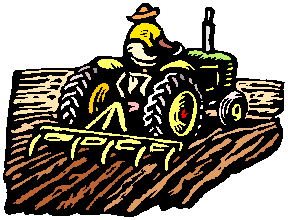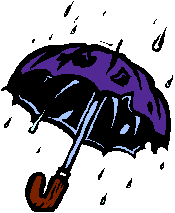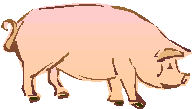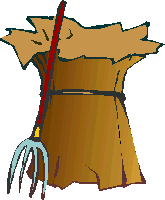Appleby History > Memories > A Country Diary Part 1
A Monthly Country Diary
January to June
by Anne Silins
Somewhere in our memory there is a record of every scene, scent and sound we have ever experienced. With some effort I find I can unlock these and bring them out to enjoy once again. Sometimes a wet day will bring back to me those damp wintry mornings when a cold east wind would be blowing and at once I am again a young girl waiting at the bottom of the drive for the bus. I loved to hear the skylarks as they rose higher and higher in the sky, singing all the way.
Life in the country follows a different calendar from life in towns and cities. The end of the farmer's year would seem to be when the crops are harvested, not December. Having said that I will tell you about a little girl’s year on the farm.
January
 Somehow I found it difficult to love January. Christmas and all the festivities that went with it were over. School began again and work around the farm seemed to be so mundane. The grasses, hedges and tree branches glistened thick with hoar frost. The land lay silent in a light mist and no birds sang. The village and the farm seemed to hibernate a bit. The daylight hours were short and outside everything was muddy, wet and cold.
Somehow I found it difficult to love January. Christmas and all the festivities that went with it were over. School began again and work around the farm seemed to be so mundane. The grasses, hedges and tree branches glistened thick with hoar frost. The land lay silent in a light mist and no birds sang. The village and the farm seemed to hibernate a bit. The daylight hours were short and outside everything was muddy, wet and cold.
January was the season for farm maintenance, hedging, ditching and fence repairs. Repairs were made to buildings and machinery and we were ever watchful during heavy frosts for freezing pipes and watchful of the needs of the livestock. In the barns, quarters were made ready for the sheep and expected February lambs.
The winter of 1947-48 was a bad one for the Midlands. We had a great deal of snow. My school report card for that particular January and February, shows that I missed six weeks of school. Buses did not run regularly and if the journey to Ashby was possible in the early morning, who knew if I could travel home again in the evening? So I was kept at home. The milk was not always picked up on schedule either and while the men fed some to the pigs, a lot went to waste.
Because this was a particularly cold January, Grandpa told me that people were stuffing bit of paper and sacking into the cracks around the windows. Nearly every house had a long sausage of cloth rolled up along the floor at the bottom of doors. Grandma and I got busy and made three of these ‘door sausages’ for the bottom of the front, back and side doors. We improved on the idea by using old lengths of dress fabric for the outer covering. By the time we were finished they looked bright and gay, and for the most part the cold draughts stayed outside as they should.
February
 It wasn’t until after the middle of February that we got the first promise of Spring. It usually came without warning, like a thief in the night. The magic of it crept through the windows one morning, telling me Spring was waiting outside. As I trudged down the driveway to catch the bus, I would see the first snowdrops, gleaming white among the dead leaves. All the hedgerow birds were busily intent upon their Spring business; - mating, flirting, building nests and just singing songs. The earth was awakening from her winter sleep.
It wasn’t until after the middle of February that we got the first promise of Spring. It usually came without warning, like a thief in the night. The magic of it crept through the windows one morning, telling me Spring was waiting outside. As I trudged down the driveway to catch the bus, I would see the first snowdrops, gleaming white among the dead leaves. All the hedgerow birds were busily intent upon their Spring business; - mating, flirting, building nests and just singing songs. The earth was awakening from her winter sleep.
I would stand and wait for the bus with my face turned up to the sky, rejoicing that spring was near and the sun had returned. Towards the end of February lambing season began. There were many long days and evenings spent supervising the ewes and sometimes searching for lambs in the fields.
That bad winter of 1947 - 48 brought even more concerns than usual for Grandpa. He had some sheep out in the meadows by the Snarestone brook. As the snow drifted higher he knew he had to bring them to the barns, a chore he had postponed too long. Already there were a few new-born lambs under the hedgerows. The snow had increased to such a depth and he could wait no longer. I was the only person free to help and off we set, an older man and a ten year old girl.
We were quite successful on our first few trips and brought a lot of sheep, even some lambs. Towards midday the wind picked up and I got colder. We were right beside the Snarestone Brook, when it all became too much for me and I must have fainted. Lambs were forgotten. Grandpa carried me all the way to the Globe Inn at Snarestone and he set me down on the bar. Anxious voices brought me out of it and a little hot brandy was poured down my throat. I was alert in a hurry, spluttering and gasping for air. That was the end of the lamb hunt for that day. A local farmer took us back to our farm in his Land Rover and my Uncle was asked to build a snow plough. My Uncle rigged up some old logs with chains and the two strongest horses were harnessed to this homemade snow plough. Up and down the driveway he went and he did a pretty good job, because after that we were able to get a tractor out to the road. Early the next morning we found the remaining sheep.
March
 As a rule it is difficult to find a good word to say about March. But Spring comes along with it, and that makes it all worthwhile. The whole countryside is in a bustle. Spring is driving everything ahead full speed. We were forced to hurry to keep pace with it all. Down by the Snarestone brook the willow trees showed signs of green, and robins were singing everywhere. I would strain to hear the first call of the male cuckoo as I walked the hedgerows looking for primroses and the violets. When I climbed under the hedgerow, clouds of white hawthorn blossoms fell in showers on my head and shoulders. I emerged covered in them.
As a rule it is difficult to find a good word to say about March. But Spring comes along with it, and that makes it all worthwhile. The whole countryside is in a bustle. Spring is driving everything ahead full speed. We were forced to hurry to keep pace with it all. Down by the Snarestone brook the willow trees showed signs of green, and robins were singing everywhere. I would strain to hear the first call of the male cuckoo as I walked the hedgerows looking for primroses and the violets. When I climbed under the hedgerow, clouds of white hawthorn blossoms fell in showers on my head and shoulders. I emerged covered in them.
Spring ploughing was not a chore for my Uncle, but a joy. He would use any excuse to stay away from school just to be ploughing. A straight furrow gave immense pride to a countryman. It was an art. I watched his progress from my perch on top of the front garden wall as he bounced along on the tractor. When he came alongside the house I saw his pride as he slowed down and turned his head back and forth to see how the furrows rolled away. And so, depending on the weather, this could be a month of great progress and anticipation, or then again, depending on the weather, just a stand-still month.
There was one special place I liked to visit and, for some reason unknown to me, March was when these visits usually took place. The blacksmith’s shop at Snarestone, was a fascinating place full of activity and colour. The work of the blacksmith could be quite dangerous but I loved to stand beside Grandpa and watch the great bellows being pumped. With a whoosh the flames leapt from the coals straight up the chimney and then the hammer rang out with a big metallic sound as all sorts of farm implements were mended. Mr. Percy Clamp owned the Forge at Snarestone. He had his own small holding behind his forge. Here he had his house and a piece of land where he kept a small herd of dairy cattle. These cattle supplied milk to some of the villagers of Snarestone. Mr. Clamp retired in 1951, the year we left for Canada. He died in August 1978 at age 92 years.
April
 April was planting season. The fields had been rough-ploughed, sometimes a second time if we had a dry winter. Now the fields had to be worked down with the cultivator and the harrow to form a seed-bed. Barley, oats and wheat made up the chief cereal crops for spring sowing.. At Easter everything was just a little greener, a smiling landscape. At Easter there were few delights such as children in town had, but I usually received a small chocolate egg from my Grandparents. I attended the Good Friday and Easter Sunday services at Church. Spring flowers made a welcome sight on the altar for these special services. The two Mrs. Gothards had done their decorating well, as usual.
April was planting season. The fields had been rough-ploughed, sometimes a second time if we had a dry winter. Now the fields had to be worked down with the cultivator and the harrow to form a seed-bed. Barley, oats and wheat made up the chief cereal crops for spring sowing.. At Easter everything was just a little greener, a smiling landscape. At Easter there were few delights such as children in town had, but I usually received a small chocolate egg from my Grandparents. I attended the Good Friday and Easter Sunday services at Church. Spring flowers made a welcome sight on the altar for these special services. The two Mrs. Gothards had done their decorating well, as usual.
April, also brought April showers. I have always liked rain because of the good it does to the earth. I like the feel of it on my face and I love the sound of it on the window panes and, even when it soaks my clothes, I never get too upset. One Spring morning I could see no reason why I should continue to wear white underwear as well as my navy blue bloomers to school. Grandma insisted it was too soon to discard the white woolen underwear, but I couldn’t wait. It was a warm Spring morning, and I was going to try it. So when I reached the end of the drive I took off the white pair and pushed them into my Wellington boots. The day proceeded as usual, except that I felt a little lighter and very grown up with only one pair of knickers on. As I got off the Ashby bus at the end of the day, I was surprised to hear people on the bus chuckling and the young people laughing. When the bus drove away, I saw my white bloomers flying like a great white flag on top of the hedge. Someone had found them and played a joke on me. I never found out who played that April trick, but that was because I also never asked!
May
 May Day was a day to celebrate. The entire village welcomed the return of warm weather, now surely summer was here. We young people fetched green branches and flowers from the gardens and woods. Girls made garlands by taping flowers around a strong piece of fencing wire, which was then attached to an old broom handle. After our noon dinner dozens of small flower-bedecked bands of children set out in high spirits to sing their way through the streets and lanes.
May Day was a day to celebrate. The entire village welcomed the return of warm weather, now surely summer was here. We young people fetched green branches and flowers from the gardens and woods. Girls made garlands by taping flowers around a strong piece of fencing wire, which was then attached to an old broom handle. After our noon dinner dozens of small flower-bedecked bands of children set out in high spirits to sing their way through the streets and lanes.
For many farmers in the district May was a sporting month. The Hunt, would, with Grandpa's permission, cross our land as they chased after the fox. “Now be a good girl, and open the gates" Grandpa would ask. It was easier to open the gates than to have them knocked down, which sometimes happened.
May was all green and flowers, filled with such joy that even the cows, goats, chickens and pigs seemed to smile. Pigs are such a wonder to watch. On a warm May morning with the help of a few well placed bricks on the pig sty wall I could climb up to the very top of that wall and look straight down into their troughs. Apples and other fruits, even vegetables, that hadn’t been used during the winter were now getting pretty rotten. I carried baskets of them to throw down the feed shute to the grateful pigs. They snorted their appreciation.
June
 The first week in June usually meant haymaking. What a joy it was to awake on a Saturday in June. The sun was up and I had already heard the train chug its way along the line at Snarestone. The sweet fragrance of new-mown hay wafted on the breeze in the warm sunshine and the swallows darted in and out of the barn. Sweet summertime in the country. It was time to be up and out in the fields.
The first week in June usually meant haymaking. What a joy it was to awake on a Saturday in June. The sun was up and I had already heard the train chug its way along the line at Snarestone. The sweet fragrance of new-mown hay wafted on the breeze in the warm sunshine and the swallows darted in and out of the barn. Sweet summertime in the country. It was time to be up and out in the fields.
The men worked in the fields from when the sun had dried the dew off the cut hay until the sun set and the dew came down again. At hay time there were carts to ride, hay-cocks to run between and tumble over, and sheds full of newly mown hay all ready for me to jump about in and generally get in everyone’s way. There were times when just as the men were ready to start cutting down would came the rain! So if the hay was ready and the sun was shining, we were true to the old saying "Make hay while the sun shines, for tomorrow may be rain.".
The women brought dinner and tea out to the men working in the fields. With their meals the men would have lemonade, cider and very occasionally beer. Tea or soup was put into screw-top bottles which were wrapped with an old towel to keep hot. We had a few vacuum flasks, but these were expensive and only used for special picnics. When the hay was ready there was not much for a small girl to do except fetch and carry for the men or, on occasion, hold a horse’s head. I just liked being there! Skill was needed to load a wagon with hay. Even though loads were roped they could still come apart if they hit a rut on the way into the stack-yard. In the stack-yard another man would be waiting to unload the cart. This job usually fell to Trevor who lived in Snarestone Lane. He was kind and a good, steady worker. He was also a big, strong man who could unload a cart in a matter of minutes. “Cor!” he said, “‘Eavy-stuff!”. He didn’t talk much, but was kind to me and would always let me ride in his empty wagons.
June was the month when the sheep were shorn. A few weeks before the shearing the sheep would all parade to the inside barnyard. This was where the sheep-dip trough was built. It was a grand trough, all tiled, with ramps leading into and out of the washing area. It was a time of confusion with men yelling, old Mick barking and the poor sheep, usually silent, now bleating in protest. Shearing was back-breaking work, and the sheep were not too happy about it either. The men would set the sheep up between their knees, sheep on its rump, and start shearing at the neck, then work down the sides. When that was done, they spun the sheep around and finished it from the underside. With a swing of the arm, the fleece was thrown on to a bench with the inside out, ready to be rolled up. If shearing was done too early in the season I would see the sheep huddle together in the shelter of a hedge for warmth.
By Anne Silins (nee Bates)

